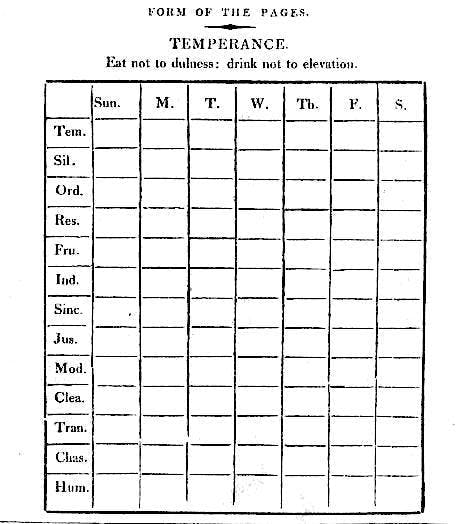Benjamin Franklin's 13 Virtues for Success
If you are interesting in learning a bit more about Benjamin Franklin's 13 Virtues, you've come to the right place. Learn more in this guide.
History of the Thirteen Virtues from Benjamin Franklin
Below, you will see a diagram of Benjamin Franklin's thirteen virtues in a handy template. This is like a habit tracker, but instead of a habit, it's based on exhibiting a virtue.

At the top of the page, Franklin would list a specific virtue that he would focus on for the week.
Here's how Franklin chose these 13 virtues:
"I propos’d to myself, for the sake of clearness, to use rather more names, with fewer ideas annex’d to each, than a few names with more ideas; and I included under thirteen names of virtues all that at that time occurr’d to me as necessary or desirable, and annexed to each a short precept, which fully express’d the extent I gave to its meaning."
At the end of the day, Franklin would mark if he exhibited the virtue. At the end of the week, he could easily review how he performed by viewing how many marks he had for a particular virtue.
We love this template because it combines the notion of choosing important values that you want to emulate, but they forces you to put these values into practice. Finally, the format is easy to digest at the end of the week.
What were Benjamin Franklin's 13 Virtues?
Here is a list of the virtues below with Franklin's description:
1.) Temperance. Eat not to dullness; drink not to elevation.
2.) Silence. Speak not but what may benefit others or yourself; avoid trifling conversation.
3.) Order. Let all your things have their places; let each part of your business have its time.
4.) Resolution. Resolve to perform what you ought; perform without fail what you resolve.
5.) Frugality. Make no expense but to do good to others or yourself; i.e., waste nothing.
6.) Industry. Lose no time; be always employ'd in something useful; cut off all unnecessary actions.
7.) Sincerity. Use no hurtful deceit; think innocently and justly, and, if you speak, speak accordingly.
8.) Justice. Wrong none by doing injuries, or omitting the benefits that are your duty.
9.) Moderation. Avoid extremes; forbear resenting injuries so much as you think they deserve.
10.) Cleanliness. Tolerate no uncleanliness in body, cloaths, or habitation.
11.) Tranquillity. Be not disturbed at trifles, or at accidents common or unavoidable.
12.) Chastity. Rarely use venery but for health or offspring, never to dullness, weakness, or the injury of your own or another's peace or reputation.
13.) Humility. Imitate Jesus and Socrates.
What was Benjamin Franklin's Daily Routine?
Benjamin Franklin employed a simple template for reflecting on his day.
In the morning he would asked "What good shall I do this day?" and then created a work schedule.
In the evening, he followed up his morning question with "What good have I done today?"
Read more about Benjamin Franklin's daily routine with an example.
How did Benjamin Franklin make decisions?
In a letter to Joseph Priestley on September 19th, 1772, Benjamin Franklin outlined how he recommended making important decisions.
The basic process Franklin outlined was to make a pros and cons list, what he called Moral or Prudential Algebra.
You can read a full breakdown of Franklin's letter to Priestley in this post, Make Decisions Like Benjamin Franklin.
